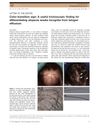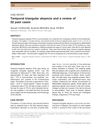A Guide to Distinguish Alopecia Areata from Other Hair Loss Diseases Presenting Similar Clinical Manifestations
January 2021
in “
Nihon rinsho hifukaikai zasshi
”
alopecia areata hair loss hair bulb hair follicles trichoscopy exclamation mark hairs broken hairs black dots short vellus hairs trichotillomania lichen planopilaris chronic lupus erythematosus tinea capitis male pattern baldness female pattern baldness triangular alopecia lymphoma syphilitic alopecia traction alopecia skin biopsy hair pull test fungal microscopy scarring alopecia histopathological diagnosis

TLDR The document provides ways to tell alopecia areata from other similar hair loss conditions, using visual checks and specific tests.
In 2021, the document provided a guide to distinguish alopecia areata, a hair loss disease characterized by clear-cut hair loss patches and inflammation around the hair bulb of growing hair follicles, from other diseases with similar clinical manifestations. The guide emphasized the importance of accurate diagnosis as treatment strategies differ. Initial diagnosis involved inquiry, visual inspection, and palpation, with a prickly sensation in the hair loss area often indicating active alopecia areata. The presence of atrophic changes in the hair bulb during a hair pull test supported the diagnosis. Trichoscopy could reveal exclamation mark hairs, broken hairs, black dots, and short vellus hairs, with exclamation mark hairs having high diagnostic value. Differential diagnoses included trichotillomania, lichen planopilaris, chronic lupus erythematosus, tinea capitis, male and female pattern baldness, triangular alopecia, lymphoma, syphilitic alopecia, and traction alopecia. Most could be diagnosed without a skin biopsy through careful clinical observation, hair pull test, and trichoscopy. Fungal microscopy of hair pull test specimens was essential for differentiating tinea capitis. Trichotillomania was suspected if trichoscopy revealed unnatural geometric hair loss patches without easy hair loss and signs like follicular microhemorrhage, V-sign, and flame hairs. The disappearance of hair pores on trichoscopy suggested scarring alopecia. If these findings were not obtained, a histopathological diagnosis through skin biopsy was necessary.








